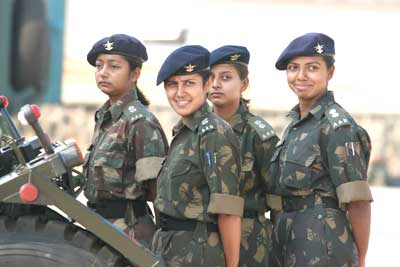'The nuclear deal required Prime Minister Manmohan Singh to gamble the future of his government on a vision for the future of his nation.'
Joe Biden marks the 10th anniversary of the India-US nuclear deal.
Aziz Haniffa/Rediff.com, in Washington, DC, listens in.

Noting that India and America have made tremendous progress in bilateral relationships in a decade after signing the landmark civic nuclear deal, United States Vice-President Joe Biden on Monday, July 13, declared that he was "relentlessly optimistic" about the future of the US-India partnership.
Delivering the keynote address at a dinner hosted jointly by the Confederation of Indian Industry and the Carnegie Endowment for International Peace, a top US think-tank, to celebrate the 10th anniversary of the signing of the India-US civil nuclear deal, Biden said the deal was imperative "not only for the sake of our two nations, but also for the sake of the region and the world -- a lot depends on this relationship."
The dinner was a reunion of all the alumni -- both in the US and India -- who were responsible for negotiating the nuclear deal along with representatives of America Inc, and leaders of the Indian-American community who feverishly lobbied successfully for the deal to be approved by both, the US Senate and the US House of Representatives, to ultimately send the agreement to the desk of President George W Bush at the end of 2008 to be signed and enacted into a law.
At the outset, Biden showered praise on then prime minister Dr Manmohan Singh, recalling how the deal required "Prime Minister Singh to gamble the future of his government on a vision for the future of his nation."
"Together, we set aside 40 years of estrangement to lay a foundation for a strategic relationship between the United States and India," he said, adding, "A relationship truly in the words of President Obama, one of the defining partnerships in the 21st century."
"And," Biden said, "it will be," and reiterated, "And if we do our job, it will be even more important every year as we move forward."
During his remarks, Biden showered praise on the "three great Indian Americans," pointing to US Congressman Dr Amerish 'Ami' Bera, the Californian Democrat and only Indian-American lawmaker in Congress, Assistant Secretary of State for South and Central Asian Affairs Nisha Desai Biswal and Assistant Secretary of State for Political-Military Affairs Puneet Talwar, whom he described as "a great and close, close, friend."
Biden, who in 2005 was chairman of the powerful Senate Foreign Relations Committee, played a key role in the Congressional passage of the civil nuclear deal.
"Ten years ago," Biden said, "I had the honour of -- because of my position as chairman of the Committee -- of leading the US Senate in an effort to ratify the US-India civilian nuclear agreement, and it helped, in my view, to remove the single largest irritant between two of the world's greatest democracies."
"For my colleagues, on both sides," he argued, it was not simply a vote for US-India civilian nuclear cooperation -- it was a vote for India. And that is how it was viewed -- it was a vote for India."
There was no denying, Biden said, that "the execution of this visionary accord took tremendous courage for both countries and diplomatic outreach in capitals all over the world."
"It required us to break entrenched orthodoxies to achieve something that in retrospect was long overdue," he said, recalling, "The US Senate's bipartisan cooperation was at a moment of deep bipartisan divide, but it united a Republican President (George W Bush) and a Democratic Congress to get behind a common goal."
"Today, our two-way trade is worth $100 billion, five times what it was 10 years ago," Biden said, "and there is no reason why it can't be five time that 10 years from now."
"Americans made more than one million trips to India last year, and today, over 100,000 Indians attend college -- young people -- in the United States of America each year," the vice-president added.
Citing example of the two countries' cooperation, Biden said, "India now conducts more military exercises with the USA than any other country of the world. Sometimes we forget what we did. It took courage on the part of two leaders to take the steps together."
"If I said that to you 10 years ago, you would have said he is certifiable."
"And all of these would go to shape the next century, if we stay the course," he said as he listed out the progress made by the two countries in many fields.
Thanks to the partnership, US nuclear reactors would provide enough electricity to power New Delhi and Mumbai through peak usage in the hottest summer days, Biden added.
A sticking point -- India's Nuclear Liability Law -- had been ironed out following President Barack Obama's visit in January, which he described as the "last stumbling block in this whole process to pave the way for our corporations in commercial negotiations."
During his speech, Biden kept returning to the theme of what a solid India-US relationship would mean and that "if they get it right, it would have a positive impact."
India, he said, was also "an essential part" of the US rebalancing strategy toward the Asia/Pacific, and declared, the US and India, could "lead as much by the power of our example as by the example of our power."
Image: Then prime minister Dr Manmohan Singh and then US President George W Bush in the Oval Office, July 18, 2005, the day India and the US signed the nuclear deal. Photograph: Eric Draper/The White House











 © 2025
© 2025